08 Jun 18 | Americas, Artistic Freedom, Awards, Cuba, Fellowship, Fellowship 2018, News and features
[vc_row][vc_column][vc_column_text]
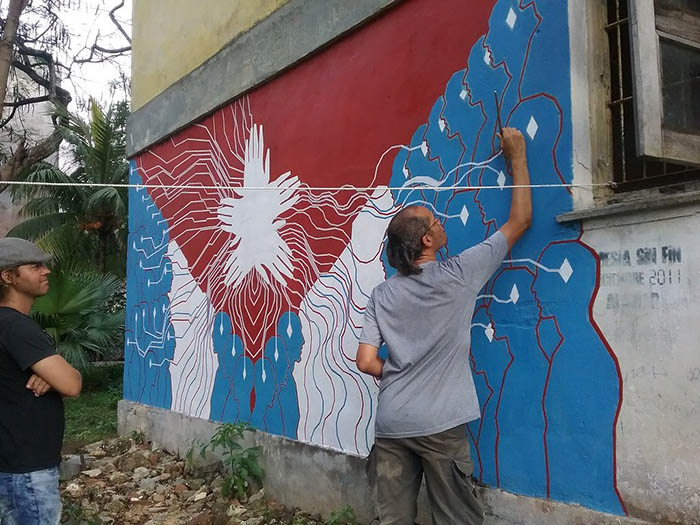
Cuban artist Yasser Castellanos
Despite official efforts to stop it in its tracks, Cuba saw the successful completion of its first independent art biennial, organised without the support of the state, on 15 May. Artist Luis Manuel Otero Alcantara and curator Yanelys Nuñez Leyva, members of the Museum of Dissidence, winner of the 2018 Index on Censorship Freedom of Expression Award for art, organised the ten-day #00Bienal de la Habana, which included over 170 artists, writers, musicians and theorists across nine different exhibitions in artists’ homes and studios around the country’s capital.
“Cuban culture is centralised culture and the government has absolute control,” Nuñez Leyva tells Index on Censorship. “The Ministry of Culture, together with all its branches such as the Union of Writers and Artists of Cuba and the National Council of Plastic Arts, are tentacles of the Ministry of the Interior, so all independent proposals, whether cultural, ecological or campaigns against gender violence, for example, are cursed with all the might of the government-controlled media.”
Even at schools pupils are served up propaganda intent on turning them against non-state-approved artists. Some art school students were shown a video portraying Otero Alcantara as a mercenary. “Such a campaign inevitably generates fear around independent projects which then suffer due to lack of both social and economic support,” Nuñez Leyva says.
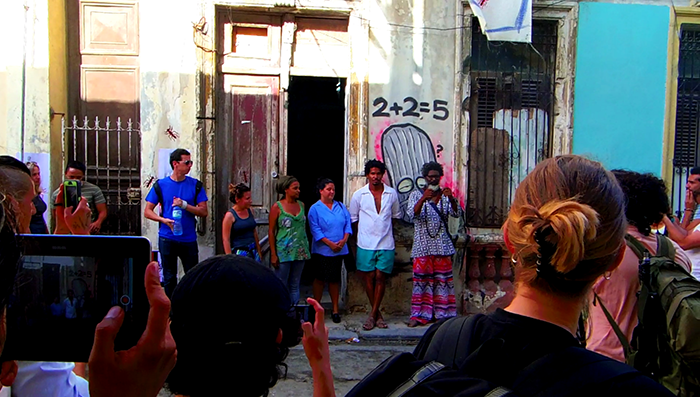
Economic support was one of the biggest obstacles for #00Bienal. “At the beginning, we thought that we would produce it with what we had at hand, but along the way we realised that we needed more,” Nuñez Leyva says. So a Gofundme campaign was set up, which raised $6,574. “But this wasn’t easy: the impact of the US blockade, our isolation from the world of networks and the impossibility of having credit cards made the process anguishing.”
Otero Alcantara was also imprisoned without cause on several occasions as part of the Cuban government’s campaign of harassment. Others who took part in #00Bienal, whether Cuban or foreign, received similar harassment. Many were even denied entry to the country, including the Cuban-American artist Coco Fusco.
When #00Biennial was announced in September 2017, the Cuban government immediately began to show its discontent through its cultural institutions. In an official declaration they branded the organisers as “unscrupulous people”. In response, #00Bienal’s first slogan was: “From the official to the unscrupulous.”
As culture is so tightly controlled in Cuba, only artists seen to be working in the interests of the regime can operate without restriction. Approved artists usually receive perks, something that gives them a higher status in society. Some artists risked all of this by taking part in #00Bienal. “The system used the worst blackmail against them because they gave the event a legitimacy that the government did not want,” Otero Alcantara says. “These artists were threatened by having their government accreditation taken away. Without this, they would find themselves without ‘official work’.”
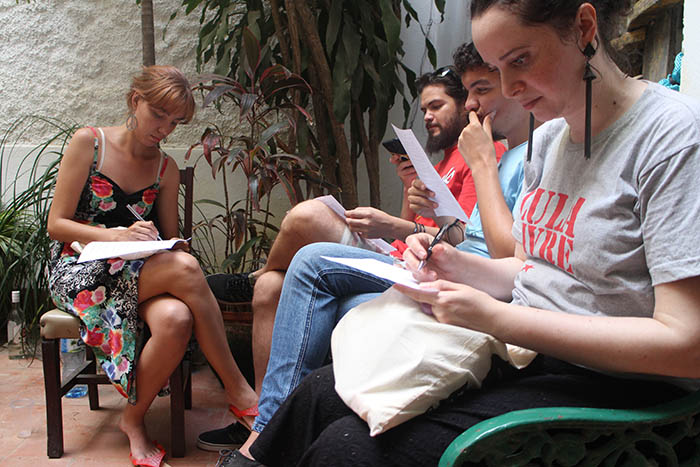
Government agents stalked the exhibitions while the organisers were accused of being in league with Cuba’s enemies. How does one respond to such accusations? “We responded by making an event that is as honest as possible, with a wide range of manifestations and artistic expressions that reflected the reality of Cuban art,” Nuñez Leyva says. “We responded with a list of more than 170 participants, not only Cubans, but from Mexico, Spain, Germany, the United States, Romania, Angola, Colombia, Denmark, Ukraine, Brazil, Venezuela, among them high-profile artists that Cuban institutions admire and collaborated with.”
The authorities even tried to prohibit the public from attending, sometimes successfully. Flyers and stickers were also confiscated. “But none of these actions were ever going to stop the energy of the event,” Otero Alcantara says.
“Despite all this pressure, the event went ahead, demonstrating that there is a group of people who are very courageous and have a real commitment culture,” Nuñez Leyva says. #00Bienal helped revive “a spirit of alternative rebellion” through the involvement of “countless numbers of totally unknown artists” that the state would never endorse.
For Otero Alcantara, the event’s success lies in the cohesion it created between artists, scholars and art enthusiasts, something that is unprecedented in the world of Cuban art. “We built an inclusive space of free creation and true collaboration between the people involved, exhibited the work of artists who were never going to have space in an official Havana Biennial and set a precedent for future projects,” he says. “This is one more step towards eliminating a fear that exists throughout Cuba.”
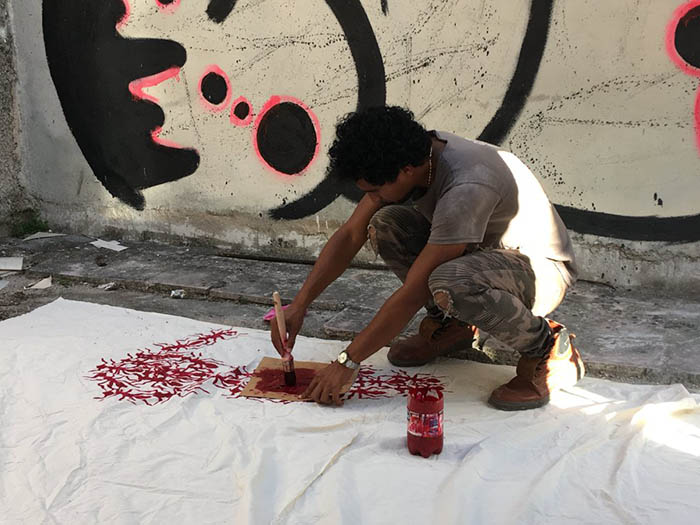
According to the organisers, the terms “revolution” or “revolutionary” have been hijacked and distorted by the Cuban regime. Such deformation has taken root so deep in the imagination of the Cuban people that just by mentioning the word “dissidence” is enough to be shunned, they explain.
“The #00Bienal was a humanistic project that brought to the fore essential values for any society such as unity, solidarity and collaboration,” Nuñez Leyva says. “The event also favoured the less privileged and created beauty and dialogue in favour of a new Cuba.”
The organisers of #00Bienal are under no illusions that life for Cuba’a dissident artists will magically become any easier under Cuba’s new president, Miguel Díaz‑Canel, who took over from Raúl Castro in April 2018. “The Cuban regime is more than any Castro,” Nuñez Leyva says. “It is a system based on a group of families that live both inside and outside the island, who have control over everything, which ultimately contributes to their own wealth.” This corrupt system relies on the deception of a people who have been left without even the strength even to protect themselves against poverty, she adds. “This situation leaves us with little hope, but we have to keep working.”
Otero Alcantara and Nuñez Leyva’s now want to show that #00Bienal wasn’t just a one-off, but is a serious project with longevity. “We will see if it is possible in two years to achieve something similar,” Otero Alcantara says.[/vc_column_text][/vc_column][/vc_row][vc_row][vc_column][vc_media_grid grid_id=”vc_gid:1528443291288-dfd45bff-0a16-7″ include=”100716,100712,100711,100710,100713,100709,100708,100707,100706,100704,100715,100705″][/vc_column][/vc_row][vc_row][vc_column][vc_column_text]
Artists, writers, musicians and theorists who took part in #00Bienal
Amaury Pacheco (Cuba), Iris Ruiz (Cuba), Coco Fusco (Cuba-USA), Tania Bruguera (Cuba), Reynier Leyva Novo (Cuba), Ernesto Oroza (Cuba), Gerardo Mosquera (Cuba), Katherine Bisquet (Cuba), Jose Ernesto Alonso, Yuri Obregón (Cuba), Alein Somonte (Cuba), Alejandro Barreras (Cuba), Anaeli Ibarra (Cuba), Alejandro Taquechel (Cuba), Ariel Maceo Tellez (Cuba), Aryam (Cuba), Aldeide Delgado (Cuba), Armando Cuspinera (Mexico), Antonio Mas (Spain), Alicia Torres (Spain), Ana Olema (Cuba), Alexis Ruiseco (Cuba-USA), Alexandru Raevschi (Germany), Andrés X (Cuba), Alain Aspiolea (Cuba), Alexandre Arrechea (Cuba), Antoni Muntadas (Spain), Biennial Project (USA), Boris González Arenas (Cuba), Colectivo Corason i uevo (Antonio A. Orta, Maykel Almenteros y Pedro Pablo Bacallao) (Cuba), Colectivo Guerrillas Girls, Celia y Yunior (Cuba), Colectivo 2.50 (Ana Gómez, Argelia Leodegarío, Marco Antonio Rodríguez, Itandehuitl Orta, Yuvia Pérez, Esmeralda Pérez) (Mexico), Carlos Manuel Álvarez (Cuba), Clara Astiasarán, Chu (Cuba), David de Omni, David León (Cuba), Danilo Maldonado (El Sexto), Diego Gil (Spain), Eliecer Jiménez Almeida (Cuba), Erish (Mexico), El Oficio (Cuba), Ernesto Hernandez Busto, Enfori García, Filipa César (Portugal), Fabián (2+2 =5) (Cuba), Francis Sánchez (Cuba), Francisco Méndez (Mexico), Francisco Masó (Cuba), Fabian Martínez, Filio Gálvez, Fredric Snitzer, Gabriel Coto (Cuba), Gerardo Stübing (España), Gean Moreno, Henri Eric Hernández (Cuba), Hamlet Lavastida (Cuba), Héctor Trujillo (Cuba), Hugo Patao, Italo Expósito (Cuba), Iván de la Nuez (Cuba), Jesús Hdez-Güero (Cuba), Jesús Benítez (Mexico), José Luis Marrero (Cuba), Josvan Gonzalez Agramonte (Cuba), Julián Yunda Yepes (Mexico), Jenifer Acuña (Cuba), Juan Melo (Colombia), Juan Carlos Alvarez Miranda (Cuba), Jean-Lorin Sterian (Romania), José Bedia (Cuba), Julio César Llopiz (Cuba), Javier Marimón, José Manuel Mesías (Cuba), Keyezua (Angola), Kevin Arrow, Lía Villares (Cuba), Luis Trápaga (Cuba), Luiso, Leandro Villanueva (Sam 33) (Cuba), Lester Dubé (Cuba), Lala Misosniky (Romania), La Alianza (Cuba), Liliam Dooley, Leandro Feal (Cuba), Lourdes Porrata, Miquel García (Spain), Marisol Maza (Mexico), Marcel Marquez (Cuba), Marianna Liosi (Germany), MO colectivo (Mariam Abrajim y Octavio Salazar) (Colombia), Magdiel Aspillaga, Mysora García, Nonardo Perea (Cuba), Natalia López (Colombia), Osmel Almaguer Delgado (Cuba), Osmany Carratalá (Cuba), Oscar Salamanca (Colombia), Orlando Hernández (Cuba), Pablo Pinto (Colombia), Polyanna Morgana (Brazil), Political Architecture: Critical Sustainability (PA:CS) (Denmark), Peter Menéndez, Rafael Carabano (Venezuela), Raúl Meriño (Cuba), Ras Yoe, Ricardo Figueredo, Rodolfo Peraza (Cuba), Rafael Domenech, Rirkrit Tiravanija, Svitlana Biedarieva (Ukraine), Soandry del Río (Cuba), Sandra Ceballos (Cuba), Santiago Alvarez Méndez (Colombia), Sandor (Cuba), Thiago Morandi (Brazil), Tomás Sánchez (Cuba), Tomas Vu, Tonel (Cuba), unx Pardo Ibarra (Colombia), Ulises Valdés (Mexico), Walfrido Valera (Cuba), Yaima Pardo (Cuba), Yasser Castellanos (Cuba), Yesica Suárez (Colombia), Yulier P. (Cuba), Yoenis Eloy Mayeta (Cuba), Yimi Konclase (Cuba), Yvelin Buenrostro (Mexico), Yucef Merhi (Venezuela), Yornel Martínez (Cuba), Yali Romagoza (Cuba), Yanier H. Palao (Cuba).[/vc_column_text][/vc_column][/vc_row][vc_row][vc_column][vc_basic_grid post_type=”post” max_items=”4″ element_width=”6″ grid_id=”vc_gid:1528443291296-0ad2c295-a239-7″ taxonomies=”104″][/vc_column][/vc_row]
07 Jun 18 | Events, Media Freedom, United States
[vc_row][vc_column][vc_single_image image=”100169″ img_size=”full”][vc_column_text]Media freedom in the United States of America has been under threat for several years, and the findings from an unprecedented mission to the US by leading human rights and media freedom organisations working on freedom of expression, reveals the true extent of the decline.
Over the last two decades, the situation has become steadily worse. Growing numbers of prosecutions against whistleblowers and journalists’ sources, attacks against and arrests of reporters covering protests, sweeping national security justifications to restrict public access to information, and border checks of journalists’ equipment, and an increasingly precarious economic situation for many news outlets, are among the pressing concerns that media workers relayed to the media freedom mission.
In our ever-shrinking globalised world, domestic policy is felt as keenly abroad as at home. That is why the impact of the decline in the US affects all of us. Our freedom to know, to criticise and to question those who hold power over us is reliant on the free flow of pluralistic and independent information.
How do we protect those freedoms?[/vc_column_text][/vc_column][/vc_row][vc_row][vc_column][vc_custom_heading text=”Speakers” use_theme_fonts=”yes”][vc_row_inner][vc_column_inner width=”1/3″][vc_single_image image=”100677″ img_size=”full” add_caption=”yes”][/vc_column_inner][vc_column_inner width=”1/3″][vc_single_image image=”100678″ img_size=”full” add_caption=”yes”][/vc_column_inner][vc_column_inner width=”1/3″][vc_single_image image=”80210″ img_size=”full” add_caption=”yes”][/vc_column_inner][/vc_row_inner][/vc_column][/vc_row][vc_row][vc_column][vc_column_text]
When: Thu 14 Jun 2018, 6:00 – 8:00pm
Where: Free Word Centre, Clerkenwell, London EC1R 3GA, UK (Directions)
Tickets: Free. Registration required.
[/vc_column_text][/vc_column][/vc_row]
06 Jun 18 | Events
[vc_row][vc_column][vc_single_image image=”100664″ img_size=”full”][vc_column_text]Celebrate the start of summer with cocktails and debate at Index on Censorship’s summer magazine launch. In the underground bar of Shoreditch’s quirkiest arts venue, The Book Club, we explore how holidaymakers’ utopian image of balmy beaches and crystal clear waters contrasts with the reality of freedoms under threat.
Join Vicky Baker, a BBC World news journalist and travel writer, in conversation with Meera Selva (former foreign correspondent reporting from Nairobi, Singapore and Berlin), Benji Lanyado (founder of the Picfair photo agency and travel writer for the New York Times) and Harriet Fitch Little (Dream Jobs series writer for the Financial Times’ travel section and former editor for local press in Lebanon and Cambodia), for a debate on whether journalists are not telling the whole story about some of the world’s favourite destinations. The event will be introduced by award-winning Index on Censorship magazine editor and former travel writer Rachael Jolley.
Index’s latest magazine Trouble in Paradise reports from Malta to Mexico, Pakistan to France and Hawaii to Sri Lanka. Also in the magazine, we interview Victoria Hislop and Ian Rankin.
There will be cocktails on arrival and possibly the odd palm tree.
With thanks to our sponsors Sage and venue partner The Book Club.
Please note, capacity is limited so please register to secure your ticket. We operate a waiting list, so please let us know if you no longer want to use your ticket.
If you have access requirements, please contact: [email protected].[/vc_column_text][/vc_column][/vc_row][vc_row][vc_column][vc_column_text]
[/vc_column_text][/vc_column][/vc_row]
05 Jun 18 | Bahrain, Middle East and North Africa, News and features
[vc_row][vc_column][vc_column_text]
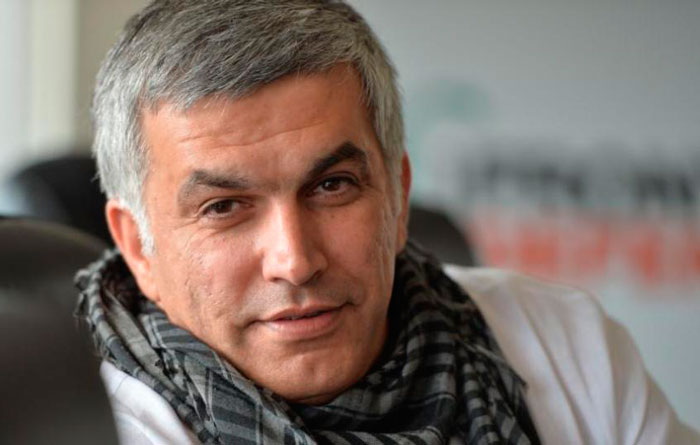
Human rights activist Nabeel Rajab has been subjected to ongoing judicial harassment.
Bahrain’s High Criminal Court of Appeal has upheld a five-year conviction for human rights activist Nabeel Rajab for critical tweets made from his account condemning Saudi-led airstrikes in Yemen and condemning the use of torture at Bahrain’s notorious Jau Prison.
Rajab, the president of the Bahrain Center for Human Rights and an Index on Censorship Freedom of Expression Award winner, has been sentenced in all to seven years in prison across two separate trials. In February 2018 he was sentenced to five years in prison for tweeting, which was added to a two-year conviction in June 2017 for “broadcasting fake news” relating to television interviews he gave in 2015.
Rajab has unsuccessfully appealed these convictions on four occasions and is expected to pursue a fifth and final appeal at Bahrain’s Court of Cassation.
Index on Censorship condemns the imprisonment of Rajab and the relentless harassment and intimidation the high-profile activist has seen since his involvement as a peaceful activist during the Bahrain uprising in 2011, during which time he has been in and out of prison on numerous occasions. He has been in prison on a continual basis since June 2016, during which time his health has deteriorated significantly.
“Nabeel Rajab is being persecuted by Bahrain for expressing his opinion,” Jodie Ginsberg, CEO of Index on Censorship, said. “Opinions are not crimes. The authorities should release him, and Bahrain’s allies – including the UK – should be advocating at the highest levels for his release.”
[/vc_column_text][/vc_column][/vc_row][vc_row][vc_column][vc_basic_grid post_type=”post” max_items=”4″ element_width=”6″ grid_id=”vc_gid:1544788614577-2ce74342-8c21-6″ taxonomies=”3368″][/vc_column][/vc_row]
05 Jun 18 | Artistic Freedom, News and features, Turkey
[vc_row][vc_column][vc_column_text]
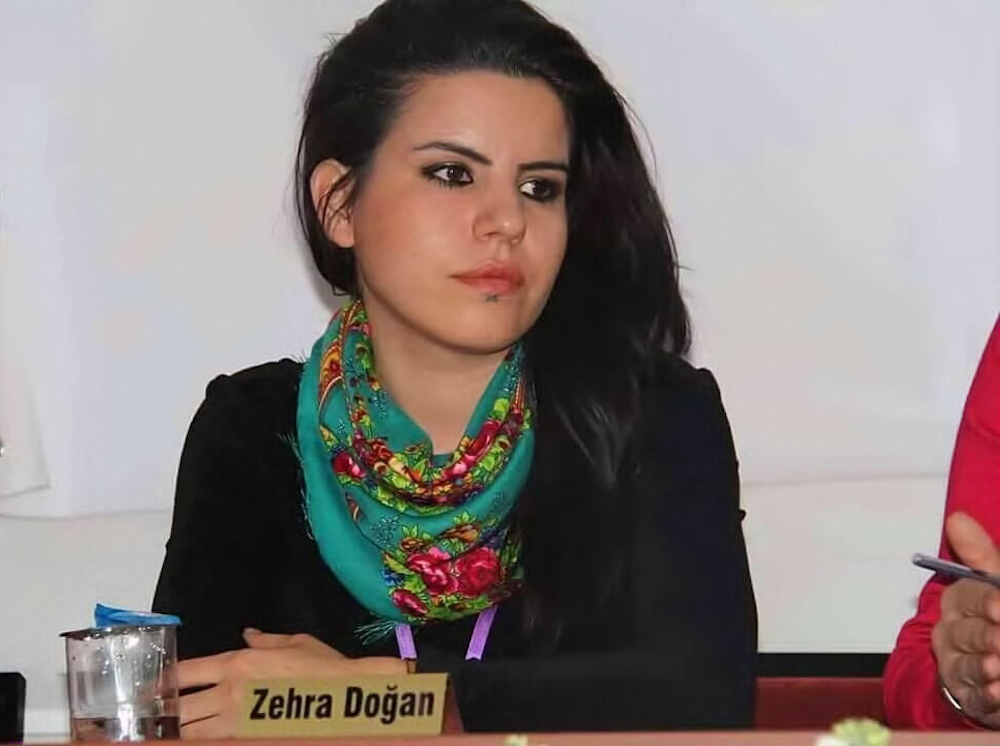
Kurdish artist and journalist Zehra Doğan
The last time Onur Erem and his girlfriend Zehra Doğan, a Turkish artist and journalist, met face-to-face, she was chirpy and seemed happy, he recalls. They sat at a picnic table and talked about her art being concurrently exhibited in various places around the world, from New York to Europe. They were surrounded by other families, busily conversing amongst each other at the picnic tables to their left and right.
But this was no picnic. Two prison guards walking up and down the aisle in between two rows of tables screwed to the concrete floor, eyeing the prisoners and their families with forced indifference masking wariness, made sure no one lost sight of the fact.
“She was in good spirits,” Erem says, attributing it to her continuing to create art while in prison, just like she did on the outside, before her sudden arrest as she was awaiting the outcome of the court case against her on charges of spreading propaganda in favour of a terrorist organisation.
“She writes down the stories of the people she met there. Since there’s not much in terms of the supplies on the inside, she uses the dyes that she makes from food. They don’t give her canvass, so she draws either on clothing or envelopes from the letters she receives. She collects the bird feathers that fall in the prison yard and makes improvised brushes out of them,” he explains.
The reason for Doğan’s incarceration was the drawing she made while covering the Turkish military operation in the town of Nusaybin on the border with Syria, populated mainly by Kurds. The drawing was made based on the photograph that had previously been circulated widely by the Turkish military on social media, according to press reports and Erem. The point of contention is whether the original photograph did or did not include the flags of the Turkish Republic hanging from buildings half-destroyed during the operation.
“She drew a military vehicle in the form of a scorpion. I’d say, this was her only addition to the photograph itself,” he says explaining that the military vehicle his girlfriend depicted in such a manner is referred to as “Akrep”, the Turkish word for a scorpion. “However the judge, in spite of all the evidence presented, sided with the opinion that the photo was taken by Zehra herself, that the original photo didn’t contain the Turkish flags hanging from the destroyed buildings and that [she] added them on for propaganda purposes, and thus, by way of this picture she was engaged in a propaganda on behalf of a terrorist organisation.”
Boxing the art
The widely-shared narrative is that Erdogan lashed out against artists after the July 2016 coup attempt. However, his government had gone after scores of artists and their freedom of artistic expression much earlier, of which Doğan is but one example. Two years after the coup, the crackdown doesn’t seem to dissipate, and the arrest of Turkish rapper Ezhel on inciting drug use in his songs on 24 May 2018 being the latest occurrence.
Attacks on artists across Turkey range from firing of one of the country’s most prominent orchestra conductors İbrahim Yazıcı for his criticism of the Erdogan government, to decapitating Ankara University’s theater department by dismissing Tülin Sağlam, its head and five other senior professors critical of the authoritarianism; from arrests of popular cartoonists, such as Cumhuriyet newspaper’s Musa Kart, to handing down a 10-months sentence against Zuhal Olcay, one of the country’s most popular singers and actresses.
The limitation of artistic freedoms is clearly a trend in Turkey, says Julie Trebault, Director of Artists at Risk Connection, an artistic freedom non-profit based in New York, adding that while in the past two years the attacks have escalated, they’d started before the coup attempt.
Years in the making
“We have several cases, for example, the case of the two filmmakers who have released their film, Bakur in 2015. Bakur was screened at many festivals in Europe for a couple of months without being censored or attacked. And then, in 2015, at the 34th Istanbul film festival, just hours before the premiere, the film got censored,” she recalls, explaining that the film was a documentary about the PKK, a Kurdistan Workers’ Party that is considered a terrorist organisation by the government of Turkey.
As to the persecution of artists even before the coup, Trebault adds “When Erdogan became president, things went down and down and down in Turkey. It took years to arrive where we are in Turkey [now]”.
Turkish filmmaker Elif Refiğ sees the roots and the reasons for the persecution of artists in the Gezi Park protests of 2013. “There had been a very serious oppositional sentiment that had collected in the society until then, that failed to organise until that moment. A very important feature, it included artistic institutions, and its nature was very creative to the extent that it changed the very definition of ‘disobedience’,” she says. According to her, it was a completely peaceful campaign spearheaded by arts institutions that didn’t tolerate violence, and it spread all over the country.
Refiğ points out that in addition to arrests, torture and jailings as ways for the state to punish the disobedient artists that often meet the eye, there are other ways of applying pressure: “The economic obstacles make the lives of the artists miserable. Blacklisting. It makes it difficult for the people to find work, impedes their freedom of movement.” As the case in point, she cites Füsun Demirel, popular television and cinema actress who has been struggling to find work for the past three years because “she is a Kurd, and because she openly voiced her opinions.”
As harmful as it is for the arts in Turkey, the crackdown on the freedom of artistic expression has also affected the general public, Trebault says.
“There’s definitely more self-censorship. People tend to get less out about those issues. People tend to be extremely careful on what they are saying,” she adds.
Responding to a question about the public’s reaction, Refiğ says that, although, the general public is critical, “Where would the criticism from the society be coming from? At this point, all television channels, all newspapers have been silenced by the forces in power.” She explains that multiple ongoing court cases against the media outlets are having a chilling effect on the public.
While the Turkish society is succumbing to self-censorship and its artists are fighting to get out their artistic word amid incarceration and repressions, the international community is struggling with possible solutions.
International support coming too late
“In my personal opinion, the international support is coming to Turkey too late,” says Refiğ. She explains that some international institutions like Pen America or Amnesty International are doing their best to call the international attention to the ongoing crisis with the freedom of expression in Turkey, while others, “institutionalised international organisations,” as she terms them, such as the E.U. and the Council of Europe, for instance, have their own pressing concerns-not letting the mass influx of refugees from the conflicts in the MENA region to cross into their borders, and, therefore, desperately needing the co-operation of the Turkish government.
“At very critical points, when they shouldn’t have restrained their words, they stood by our government, as they were afraid of the opening of the borders [by Turkey] and a free movement of Iraqi and Syrian refugees to Europe” she says of the international institutions. “Hypocrisy is the word that even might come to one’s mind. Words-wise, there’s a lip service to improving the human rights situation in Turkey, but action-wise, there’s very little acting upon it, unfortunately.”
Trebault, on the other hand, says Turkey, as a member of various international bodies is a signatory to important international human rights treaties, and Western governments should call on its government to abide by them.
Grim prospects, great expectations
Looking into the future, Trebault says she doubts things will get better in the next few years in Turkey.
“In 2017 the referendum gave even more power to the president,” she says of the plebiscite that effectively abolished the parliamentary system existing at the time and replaced it with the presidential system with a much stronger executive. “So, to be honest with you, I don’t think there will be changes for the better with this government,” she says.
Back in Diyarbakır’s E-type maximum security prison, while counting days until her release, Doğan is also pondering her future.
Making plans for after her release upon completing her two-and-a-half-year sentence next February, Erem says Doğan plans to continue working on her art, as well as her work as a journalist. “Currently, there’s an exhibit of her artwork In France that includes paintings and drawings smuggled out of the prison, as well as her previous work. This draws the attention of the artistic community, as well as the society at large, that’s why she wants to continue.”
He says that his girlfriend is also taking notes while in prison that she’s planning to use for writing a book when she is out.
“Of course, the solidarity that she sees on the outside also helps a lot. [It] helps her and her jailed friends to keep their spirits high, as they see that their voices are heard on the outside and there are quite a few people who don’t want to leave their side.”[/vc_column_text][/vc_column][/vc_row][vc_row][vc_column][vc_basic_grid post_type=”post” max_items=”4″ element_width=”6″ grid_id=”vc_gid:1528275200044-7774f8c3-7f31-3″ taxonomies=”8607″][/vc_column][/vc_row]
04 Jun 18 | Artistic Freedom, Europe and Central Asia, News and features, Risks, Rights and Reputations, United Kingdom
[vc_row][vc_column][vc_column_text]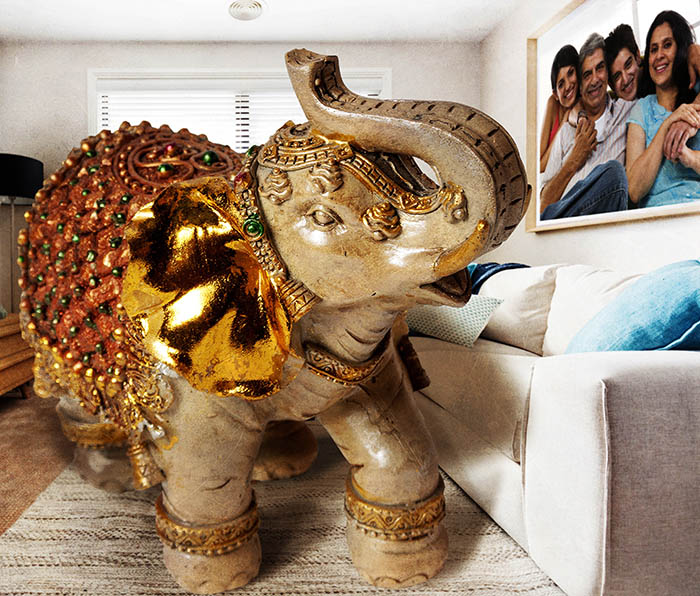
On Saturday 24 March the final performance of my play Elephant was cancelled in Birmingham, bizarrely the same city where, just over 13 years ago, my play Behzti was closed after protests against the show turned violent. Last month, a different kind of protest brought the run of Elephant to its premature end. The Football Lads Alliance were in town, apparently marching against “extremism” on the same day as the play’s final outing.
Elephant had completed a run in the Birmingham Rep’s studio space, The Door, and was on tour in the community. The last performance was for a closed group of visually impaired adults from a local charity and was scheduled to go on at the Old Joint Stock, a pub theatre in the city centre. However, because of the FLA demonstration, many local pubs, including the Old Joint Stock, which happened to be near the focal point of the rally, closed, following police advice.
The Rep found another location for the show, a large room at the theatre, but the charity did not feel safe bringing their group across town, such was the atmosphere of trepidation surrounding the march. With no audience, there was to be no show.
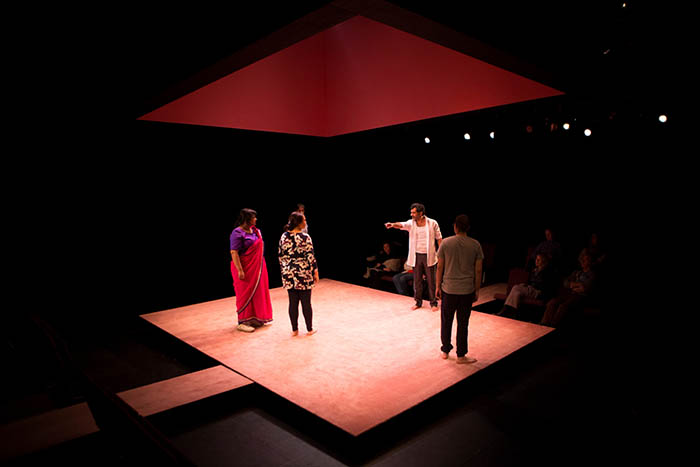
The cast of Elephant. Credit: Ellie Kurttz
Elephant was certainly not targeted like Behzti, it was simply collateral damage, as were the many businesses who lost significant income and the thousands of ordinary people who were intending to come into town to work and play in their city, but ended up changing their plans.
The FLA marching in Birmingham, a city defined by multiculturalism, was clearly an act of provocation. Everyone has a right to protest but the question here is about the policing of such action. The police facilitated the FLA and their cohort, most of whom came from outside the West Midlands, protecting their freedom to express their views. Afterwards the police framed the march as a success and Birmingham West Chief Superintendent Danny Long thanked the public for their understanding, saying: “Our aim was to facilitate the lawful protest and lawful assembly of all the groups here and that’s what’s happened.” Words which show little regard for the lawful freedoms of local people.
The clear message given out by the police was one of fear – keep a low profile and stay away, because today this is not your city. It’s a dysfunctional way of keeping order, one that we’ve got used to and don’t question. Peddling this type of fear gives credence to abhorrent views and fuels underlying tensions.
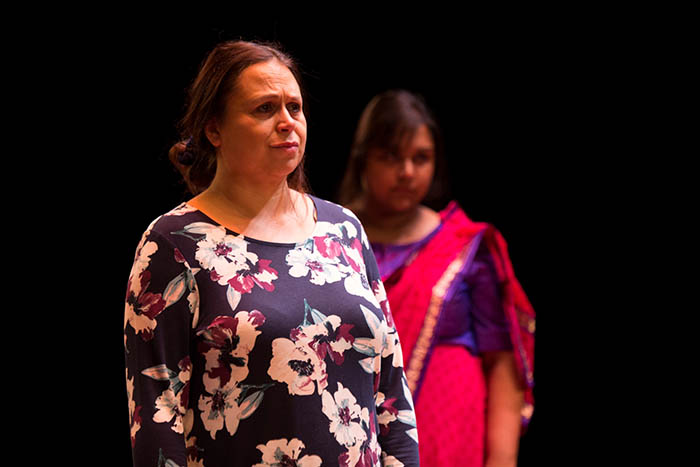
Yasmin Wilde as Deesh in Elephant. Credit: Ellie Kurttz
The West Midlands police have considerable form. Five years after Behzti was cancelled (the main reason being that because the police said they could not guarantee the safety of staff or public), Penny Woolcock’s film 1Day was removed from Birmingham cinemas after the same police force suggested it might incite gang violence. In 2010, during rehearsals of my play Behud, the police asked the Coventry Belgrade to pull the production, as they were expecting protests. The theatre refused and the show continued without incident.
Each of these situations tells us more about the police’s anxieties than our own. Given their attitude around the FLA march, there is clearly still much to learn about managing order in a city where almost half the population do not identify as white British. In her speech at the demonstration, the leader of far-right organisation For Britain, said: “We are living through a dark time in this country.” It’s a dark time indeed when the freedoms of racists brought in to intimidate and frighten a community, trump the freedoms of that very community to live their lives.
What happened in Birmingham last month raises questions of power and control. Who runs our cities and who are they for? The FLA march left a trace of unease and fracture in a city where many of its inhabitants already feel marginalised.
Elephant tells the story of a woman who is ostracised for telling the truth about being abused as a child. Although the circumstances of the play’s cancellation were totally different to Behzti in 2004, it’s hard not to feel a similar sense of sadness and loss at having been silenced.
Facilitating an inflammatory protest at the expense of the freedoms of the silent majority is no victory and shutting people out of their own city is no fit way of dealing with tensions between communities. Public order should be maintained in a fair and equal way, otherwise those who shout loudest get heard, and everyone else ends up without a voice.[/vc_column_text][vc_column_text]
ALSO READ
[/vc_column_text][/vc_column][/vc_row][vc_row][vc_column width=”1/3″][staff name=”Gurpreet Kaur Bhatti on Behzti” profile_image=”100618″]When I started writing my third play, Behzti, in 2003 I could never have imagined the furore which was going to erupt. There was an atmosphere of great tension in the lead up to its production in December 2004, and it was indeed an extraordinary time. Mass demonstrations culminated in a riot outside the theatre. Read on[/staff][/vc_column][vc_column width=”1/3″][staff name=”Birmingham Repertory Theatre: Behzti” profile_image=”100620″]In December of 2004, Birmingham Repertory Theatre staged the world premiere of Behzti, a new play by Gurpreet Kaur Bhatti, in the smaller of its two theatres, The Door, which is a space exclusively dedicated to the production and presentation of new plays. “Behzti” is a word in common usage amongst the Punjabi speaking community meaning “dishonour” or “shame”. Read on[/staff][/vc_column][vc_column width=”1/3″][staff name=”Challenging the UK’s risk averse culture” profile_image=”100621″]It’s easy to dismiss the importance of arts in a democracy; its social value is disregarded when it is seen as the province of the rich and privileged. Yet when we look to more authoritarian regimes across the globe Index is reminded constantly of the importance of the role of arts as a voice of dissent and the extraordinary amount of time that repressive states spend suppressing it. Read on[/staff][/vc_column][/vc_row]
01 Jun 18 | News and features, Volume 47.01 Spring 2018, Volume 47.01 Spring 2018 Extras
[vc_row][vc_column][vc_column_text][/vc_column_text][/vc_column][/vc_row][vc_row][vc_column][vc_column_text]Index on Censorship magazine was at Hay Festival in Wales at the end of May. We spoke to three leading authors – David Olusoga, Juan Gabriel Vásquez and Javier Cercas – about taboos in their own countries, the issues that people are not talking enough about and the stories that might be currently manipulated.
Photo credit: Hay Festival/Joseph Albert Hainey/Marsha Arnold[/vc_column_text][/vc_column][/vc_row][vc_row][vc_column width=”1/3″][vc_custom_heading text=”The Abuse of History”][vc_column_text]The spring 2018 issue of Index on Censorship magazine takes a special look at how governments and other powers across the globe are manipulating history for their own ends
With: Simon Callow, David Anderson, Omar Mohammed [/vc_column_text][/vc_column][vc_column width=”1/3″][vc_single_image image=”99222″ img_size=”medium”][/vc_column][vc_column width=”1/3″][vc_custom_heading text=”Subscribe”][vc_column_text]In print, online. In your mailbox, on your iPad.
Subscription options from £18 or just £1.49 in the App Store for a digital issue.
Every subscriber helps support Index on Censorship’s projects around the world.
 SUBSCRIBE NOW[/vc_column_text][/vc_column][/vc_row]
SUBSCRIBE NOW[/vc_column_text][/vc_column][/vc_row]
31 May 18 | Campaigns -- Featured, Statements
Andy Burnham
Mayor of Greater Manchester
Manchester, UK
[email protected]
31 May 2018
Dear Mayor Burnham,
The undersigned organisations are writing to you to request your support for the release of the award-winning Emirati human rights defender Ahmed Mansoor, sentenced this week to ten years in prison for his human rights activism. We believe that this will be facilitated by raising awareness of his case by naming a street after him in Manchester.
Ahmed Mansoor is a pro-democracy and human rights campaigner who has publicly expressed criticism of serious human rights violations in the United Arab Emirates (UAE).
Mansoor was sentenced to ten years in prison by the State Security Court in Abu Dhabi on 29 May 2018 for “insulting the status and prestige of the UAE and its symbols”, including its leaders, as well as of “seeking to damage the relationship of the UAE with its neighbours by publishing false reports and information on social media.”
Mansoor is the 2015 Laureate of the Martin Ennals Award for Human Rights Defenders, and a member of the Gulf Centre for Human Rights (GCHR) Advisory Board and Human Rights Watch’s Middle East Advisory Committee. Amnesty International considers him to be a prisoner of conscience, imprisoned solely for exercising his right to freedom of expression, who should be immediately and unconditionally released. There are concerns that Mansoor has been tortured in pre-trial detention that lasted more than one year.
On 20 March 2017, about a dozen Emirati security officers arrested him at his home in
Ajman in the early hours of the morning. The UAE’s official news agency, WAM, claimed that Mansoor had been arrested on the orders of the Public Prosecution for Cybercrimes,
detained pending further investigation, and that he was accused of using social media websites to: “publish false information and rumours;” “promote [a] sectarian and hate-incited agenda;” and “publish false and misleading information that harms national unity and social harmony and damages the country’s reputation.”
Human rights groups are banned in the UAE and people in the UAE who speak out about human rights abuses are at serious risk of arbitrary detention, imprisonment, and torture and other ill-treatment. Many such people are serving long prison terms or have felt they have no choice but to leave the country.
Before his arrest, Mansoor was the last remaining human rights defender in the UAE who had been in a position to criticise the authorities’ human rights record publicly.
As you are aware, Manchester City Council has developed close commercial links with senior figures in the UAE government, via its stake in the Manchester Life Development Company (MLDC), a joint venture ultimately controlled by the Abu Dhabi United Group for Investment and Development (ADUG). ADUG is owned and controlled by the Abu Dhabi Executive Affairs Authority, whose chair is Mohamed bin Zayed Al-Nahyan, the de facto ruler of the UAE. In addition, Manchester City FC is owned by the deputy Prime Minister of the UAE, Sheikh Mansour bin Zayed Al Nahyan.
While Abu Dhabi’s investments may have brought financial benefits to Manchester, this should not preclude criticism of human rights violations in UAE – violations which are starkly at odds with the values and principles that Greater Manchester celebrates as part of its heritage. In recent years, Senior members of Manchester City Council have celebrated Manchester’s long history of standing up for a range of rights-related causes, including the anti-slavery movement, votes for women, and pro-democracy demonstrations in Manchester in 1819. But they have apparently shied away from criticising human rights violations by the UAE and Abu Dhabi authorities with whom their commercial partners are linked.
We support the local residents who are part of the “Ahmed Mansoor Street” campaign, who argued it would be “a fitting honour to bestow upon an individual who embodies so many of the qualities that the city and the wider region celebrates as a key part of its history.”
As the first directly-elected Mayor of Greater Manchester you are in a unique position to show leadership on this issue. In your manifesto for the Mayoralty you referred to Greater Manchester as “the home of radical forward thinking” and expressed your desire to make it “a beacon of social justice for the country.” Your public support for a street named after Ahmed Mansoor, and calling for his immediate and unconditional release, would demonstrate your commitment to this heritage and these ideals.
Signed,
- Adil Soz
- Americans for Democracy & Human Rights in Bahrain (ADHRB)
- Amnesty International
- Arabic Network for Human Rights Information (ANHRI)
- Association for Freedom of Thought and Expression (AFTE)
- Asociación Mundial de Radios Comunitarias América Latina y el Caribe (AMARC ALC)
- Bahrain Institute for Rights and Democracy (BIRD)
- Bytes For All
- Cairo Institute for Human Rights Studies (CIHRS)
- Cartoonists Rights Network International (CRNI)
- CIVICUS
- European Centre for Democracy and Human Rights (ECDHR)
- FIDH, within the framework of the Observatory for the Protection of Human Rights Defenders
- Freedom Forum, Nepal
- Free Media Movement, Sri Lanka
- Front Line Defenders
- Gulf Centre for Human Rights (GCHR)
- Human Rights Watch
- Index on Censorship
- International Press Centre, Nigeria
- International Service for Human Rights (ISHR)
- Maharat Foundation
- Martin Ennals Foundation
- National Union of Somali Journalists (NUSOJ)
- Palestinian Center for Development and Media Freedoms (MADA)
- PEN Canada
- Reporters Without Borders (RSF)
- South East Europe Media Organization
- Syrian Centre For Media And Freedom Of Expression
- Vigilance for Democracy and the Civic State, Tunisia
- World Organisation Against Torture (OMCT), within the framework of the Observatory for the Protection of Human Rights Defenders
Note to supporters and media: The street-naming campaign event will take place on 01 June 2018 at 2pm on Thomas Street in the Northern Quarter.
Join us! Email your message or Tweet using the hashtag #FreeAhmed to the following:
UAE Authorities:
31 May 18 | Mapping Media Freedom, Media Freedom, News and features
[vc_row][vc_column][vc_column_text]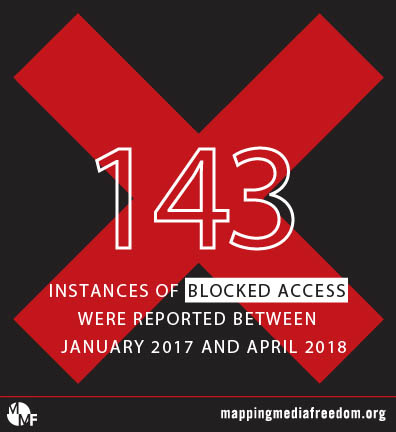 From the beginning of 2017 until April 2018, 143 reports of blocked access, in which journalists were expelled from a location or prevented from speaking to a source, were submitted to Index on Censorship’s Mapping Media Freedom project. Out of the 25 countries in which such violations have occurred, the five worst were: Ukraine, Russia, Belarus, Turkey and France.
From the beginning of 2017 until April 2018, 143 reports of blocked access, in which journalists were expelled from a location or prevented from speaking to a source, were submitted to Index on Censorship’s Mapping Media Freedom project. Out of the 25 countries in which such violations have occurred, the five worst were: Ukraine, Russia, Belarus, Turkey and France.
“Mapping Media Freedom has highlighted is a continual prevention of journalists from doing their job by way of blocked access,” Joy Hyvarinen, head of advocacy at Index on Censorship, said. “For the sake of the public’s right to know, journalists must be granted access in order to eliminate the problem of important issues going underreported.”
Ukraine
With 20 separate incidents of blocked access, Ukraine tops the list. Thirteen of the reports involved Russian or Georgian media outlets, highlighting the tension between the three countries, with November 2017 being the busiest month, with five violations recorded. At least 12 journalists were barred from entering the country in the last 15 months, with another six being deported. Among those deported was Georgian television channel Rustavi-2 journalist Tamaz Shashvishvili, who was forcibly detained in November 2017 by around 15 armed members of Ukraine’s security services who stormed his apartment, hit him in the face with a pistol and blindfolded him.
In another case, two Spanish journalists were deported to the Netherlands in August 2017 and banned from entering the country for three years after being detained for about 20 hours at Kyiv International Airport. They say they were treated like “criminals” and blacklisted from the country until 2020. A spokeswoman for the Ukrainian secret service said that the journalists were barred because of their “activities that contradict the national interest of Ukraine”.
Russia
In Russia, journalists were denied access on 18 occasions, including 10 times from courtrooms and state assemblies. In March 2018, while live reporting from the Dzerzhinsky District Court of St. Petersburg, Sasha Bogino, a correspondent for the online news site Mediadzona, and her colleague photographer David Frenkel were dragged from the hall. In January 2018, journalists were barred from former Kirov governor Nikita Belykh’s court hearing for bribery.
In January 2018, investigative website Russiangate was closed down three hours after publishing an article claiming to have traced expensive properties to director of Russian secret service FSB Aleksandr Bortnikov, following a request of the General Prosecutor’s Office. Editor-in-chief Aleksandrina Elagina was subsequently dismissed from her position, with investors pulling funding for the site causing it to close.
Belarus
In Belarus eight cases, usually with inadequate explanation, were reported. Pavel Dailid, a journalist for the website Pershy Regiyon, was barred from reporting at a local council meeting in December 2017, when deputy chairman of the Ivatsevichi district Ideology department Aliaksandr Velikaselets demanded to see “an accreditation by the local government” despite the council meeting being as open to the public. In another case, a correspondent for the independent newspaper Hazeta Slonimskaya was barred from local meeting in May 2017 by a government official who stood in front of the entrance calling the paper biased. The journalist was invited to the meeting by local residents.
Photojournalists have also been targeted. In July 2017 city authorities in Babruisk banned photography and filming during Belarus’ Independence Day. Journalists for the newspaper Bobruiski Courier and others, therefore, had no opportunity to photograph the festivities during the public holiday. Two months later a journalist was denied accreditation by the Foreign Ministry for the eighth time. The ministry noted that Victar Parfionenka’s accreditation had been rejected because he “had carried out journalistic activities on behalf of a foreign media outlet without accreditation of the Ministry of Foreign Affairs in Belarus”.
Turkey
In the seven out of nine reports from Turkey, access to a number of websites and TV stations was denied. Sendika, a left-wing labour-oriented news website, has been blocked 23 times in all. In January 2018 access to five news websites was banned, including feminist and pro-Kurdish news website jinnews.org, over a report on the murder of three Kurdish women in Paris in January 2013. Access to daily-German newspaper BILD was blocked online in February 2017 after its harsh criticism of the arrest of German-Turkish reporter Deniz Yucel, a correspondent for daily newspaper Die Welt. Kurdish-language newspaper Rojava Medya was also blocked online in May 2017, most likely for its position as the informal successor of Azadiya Welat, which was shut down under State of Emergency rules introduced after the coup attempt on 15 July.
France
Eight reports of blocked access were reported in France. With a presidential election underway in 2017, five of these involved journalists being denied access to candidates, usually by force.
In April 2017, two Buzzfeed News journalists, David Perrotin and Paul Aveline, were physically prevented from filming a meeting with Francois Fillon. The journalists were filming two people who had interrupted a meeting with Filion when security personnel grabbed the men, threatened them and demanded they delete their footage. It was only when the journalists threatened to write an article about the incident that security backed off.
A similar incident occurred in February 2017 when three journalists were violently expelled from a conference with Marine Le Pen, president of the National Front. Working for the daily current affairs show Quotidien, the journalists were violently kicked out of a conference after attempting to ask Le Pen a question about claims she had misused European Parliament funds to pay her bodyguards. Before journalist Paul Larrouturou could finish his question, he was grabbed, ejected by security and was prevented, along with his two colleagues, to regain access, despite his official accreditation. [/vc_column_text][/vc_column][/vc_row][vc_row][vc_column][vc_basic_grid post_type=”post” max_items=”4″ element_width=”6″ grid_id=”vc_gid:1528726702751-832c0106-cd52-7″ taxonomies=”6564″][/vc_column][/vc_row]
30 May 18 | Campaigns -- Featured, Statements
[vc_row][vc_column][vc_column_text]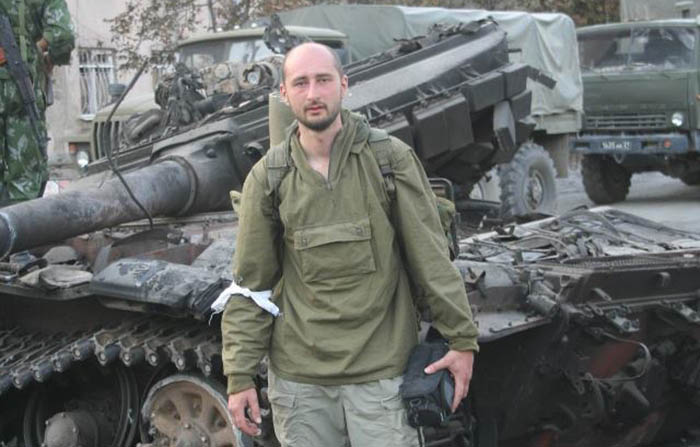
Updated statement: High profile Russian journalist and Kremlin critic Arkady Babchenko staged his own “murder”, it was revealed in a press conference where the journalist appeared on Wednesday 30 May. Earlier news reports have said he was shot and killed in Kiev, Ukraine, at his home, where he lived with his wife. However, that has since been revealed to be untrue.
Babchenko claimed it was necessary to do this in order to catch people who were trying to kill him.
Babchenko left Russia in February 2017, writing that it was “a country I no longer feel safe in”. Babchenko, a former war correspondent for Novaya Gazeta, was known for his fierce criticism of Russia’s annexation of Crimea, its support for separatists in eastern Ukraine and its military intervention in Syria.
Index calls on the Ukrainian police to continue their investigations into the 2016 murder of journalist Pavlo Sheremet, which has yet to be solved.[/vc_column_text][/vc_column][/vc_row][vc_row][vc_column][vc_basic_grid post_type=”post” max_items=”4″ element_width=”6″ grid_id=”vc_gid:1527698401910-293e4fff-01bc-10″ taxonomies=”15″][/vc_column][/vc_row]
29 May 18 | Campaigns -- Featured, Press Releases
[vc_row][vc_column][vc_column_text]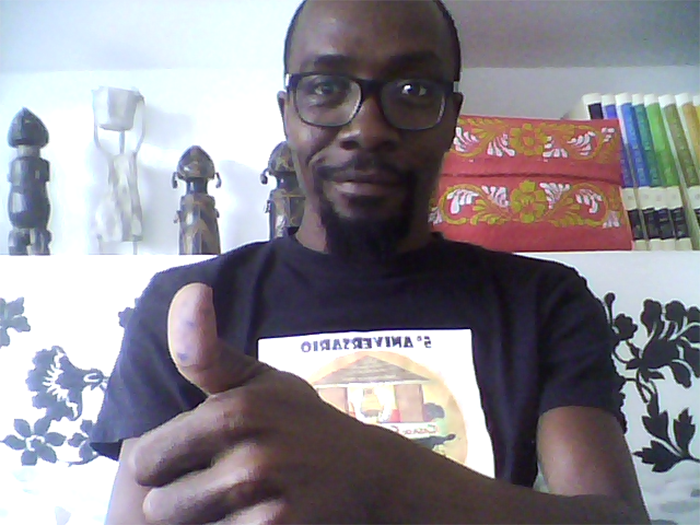
Nairobi, 29 May 2018 — The Equatorial Guinean artist Ramón Esono Ebalé left the country on 28 May 2018 after being imprisoned for six months on apparently false charges and then waiting three months for travel documents, 13 rights organisations said today.
“Ramón Esono Ebalé’s nine-month saga shows how many tools the Equatorial Guinean government has at its disposal to silence critics,” said Sarah Saadoun, of Human Rights Watch. “But it also is a powerful example of how solidarity and activism can confront abuses.”
Esono Ebalé, a prominent artist and cartoonist often critical of the government, who travelled to Equatorial Guinea to request a passport, was arrested on 16 September 2017 in Malabo, the capital, and charged almost three months later with counterfeiting around US$1,800 worth of the local currency. The line of questioning during the interrogation and a lack of evidence raised serious concerns that the allegations were politically motivated. These concerns were bolstered during the trial when the government’s sole witness admitted on the stand that he was just following his bosses’ orders.
The judge dismissed the case on February 27, and Esono Ebalé was freed, but he remained effectively trapped in the country because he lacked the proper travel documents. He was finally issued a passport on 23 May and left the country five days later.
Throughout this ordeal, dozens of cartoonists’ rights and human rights organisations and advocates worked to publicise the case internationally, including with the United Nations and global policymakers. The African Commission on Human and Peoples’ Rights wrote a letter of appeal to the Equatorial Guinean government, and US Senator Richard Durbin remained actively engaged with the case.
“We, the #FreeNseRamon coalition, hundreds of artists, journalists, activists, rights defenders and supporters from around the world, celebrate that Ramón will finally be able to see his loved ones after an ordeal that lasted almost nine months,” said Tutu Alicante, executive director of EG Justice, a group that monitors the government’s human rights record. “Many critical voices remain silenced and imprisoned in Equatorial Guinea, but today, we rejoice that one of those talented activists is free and can go back to drawing truth to power.”
The human rights groups and advocates are APIM, Arterial Network, Committee to Protect Journalists, CRNI, Caoilfhionn Gallagher QC, Jonathan Price, Paul Mason, International Media Defence Panel, Doughty Street Chambers, EG Justice, FIDH, within the framework of the Observatory for the Protection of Human Rights Defenders, World Organisation Against Torture (OMCT), within the framework of the Observatory for the Protection of Human Rights Defenders, FREEMUSE, Human Rights Watch, Index on Censorship, PEN International, and Reporters without Borders.
For more Human Rights Watch reporting on business and human rights, please visit:
https://www.hrw.org/topic/business
For more Human Rights Watch reporting on Equatorial Guinea, please visit:
https://www.hrw.org/africa/equatorial-guinea
For more information, please contact:
In Chapel Hill, for EG Justice, Tutu Alicante (Spanish, English, French): +1-615-479-0207 (mobile); or [email protected]. Twitter: @TutuAlicante
In New York, for Human Rights Watch, Sarah Saadoun (English): +1-917-502-6694 (mobile); or [email protected]. Twitter: @sarah_saadoun
In New York, for Committee to Protect Journalists, Angela Quintal (English): +212-300-9004 (office); or [email protected]. Twitter: @angelaquintal[/vc_column_text][/vc_column][/vc_row][vc_row][vc_column][vc_basic_grid post_type=”post” max_items=”4″ element_width=”6″ grid_id=”vc_gid:1527671995212-60b2f95f-3eaa-10″ taxonomies=”19377″][/vc_column][/vc_row]
29 May 18 | Index in the Press
One of the sons of assassinated journalist Daphne Caruana Galizia said it feels like his family is at war with the Maltese government over their quest to find out who murdered his mother. Read in full.











 From the beginning of 2017 until April 2018, 143 reports of blocked access, in which journalists were expelled from a location or prevented from speaking to a source, were submitted to Index on Censorship’s Mapping Media Freedom project. Out of the 25 countries in which such violations have occurred, the five worst were: Ukraine, Russia, Belarus, Turkey and France.
From the beginning of 2017 until April 2018, 143 reports of blocked access, in which journalists were expelled from a location or prevented from speaking to a source, were submitted to Index on Censorship’s Mapping Media Freedom project. Out of the 25 countries in which such violations have occurred, the five worst were: Ukraine, Russia, Belarus, Turkey and France.
